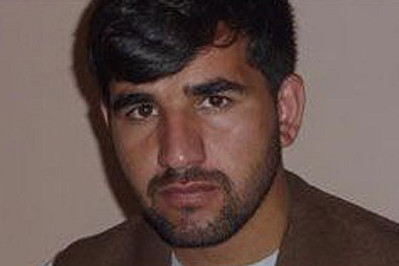By Ben Farmer

BBC reporter Ahmed Omed Khpulwak
Ahmed Omed Khpulwak was among at least 22 killed, mostly civilians, during a two-pronged militant attack on government buildings in Uruzgan province last month.
An independent investigation has now found he appeared to have been shot dead by American weapons after the attackers were already dead.
The BBC has asked the Nato-led coalition to investigate his death and the findings of that formal inquiry are expected to be released soon.
Khpulwak, 25, was a reporter for the BBC Pashto service and had done freelance work for The Daily Telegraph.
He was working in the office of state broadcaster RTA in the town of Tarin Kowt on July 28 when a suicide car bomb blew up outside and two attackers rushed in.
The compound was counter attacked soon after by American special forces soldiers and the two suicide bombers blew themselves up.
According to an investigation by the Afghanistan Analysts' Network, an independent Kabul-based research group, Khpulwak may have survived the initial assault only to be shot by coalition forces clearing the building.
The investigation, by Kate Clark, concluded: "It seems – in what would be the worst luck of all – that Omed may have survived the suicide bombs, only to be shot dead by US special forces when they entered the ruined RTA building."
Khpulwak hid in a bathroom during the attack and texted his family, once saying: "I am hiding. Death has come" and 25 minutes later: "Pray for me if I die." The second message appeared to have been sent after the suicide attackers had exploded.
He was later found dead by Afghan police in the bathroom, seemingly untouched by blast injuries, but riddled with at least 11 gunshot wounds.
His body was buried quickly according to custom, but examination of spent bullets littering the bathroom where he died found they were US-made and probably fired from a US M60 machine gun.
The investigation found: "One possible scenario for Omed's death could be that, after the latter two bombs, whoever entered the building anticipated that more Taliban were hiding there and misidentified Omed as a combatant."
It added: "The key legal question would be whether those forces could reasonably have deduced that Omed was not a Taliban fighter, but a civilian."
Lt Col Jimmie Cummings, a spokesman for the coalition, said: "The investigation is still ongoing."
A spokesman for the BBC said: "Following the death of BBC stringer, Ahmed Omed Khpulwak, in southern Afghanistan's Uruzgan province last month various conflicting reports have emerged regarding the facts surrounding his death.
"The BBC officially requested that [the coalition] inquires into the circumstances of his death and reports the findings to the BBC and to his family as urgently as possible."



